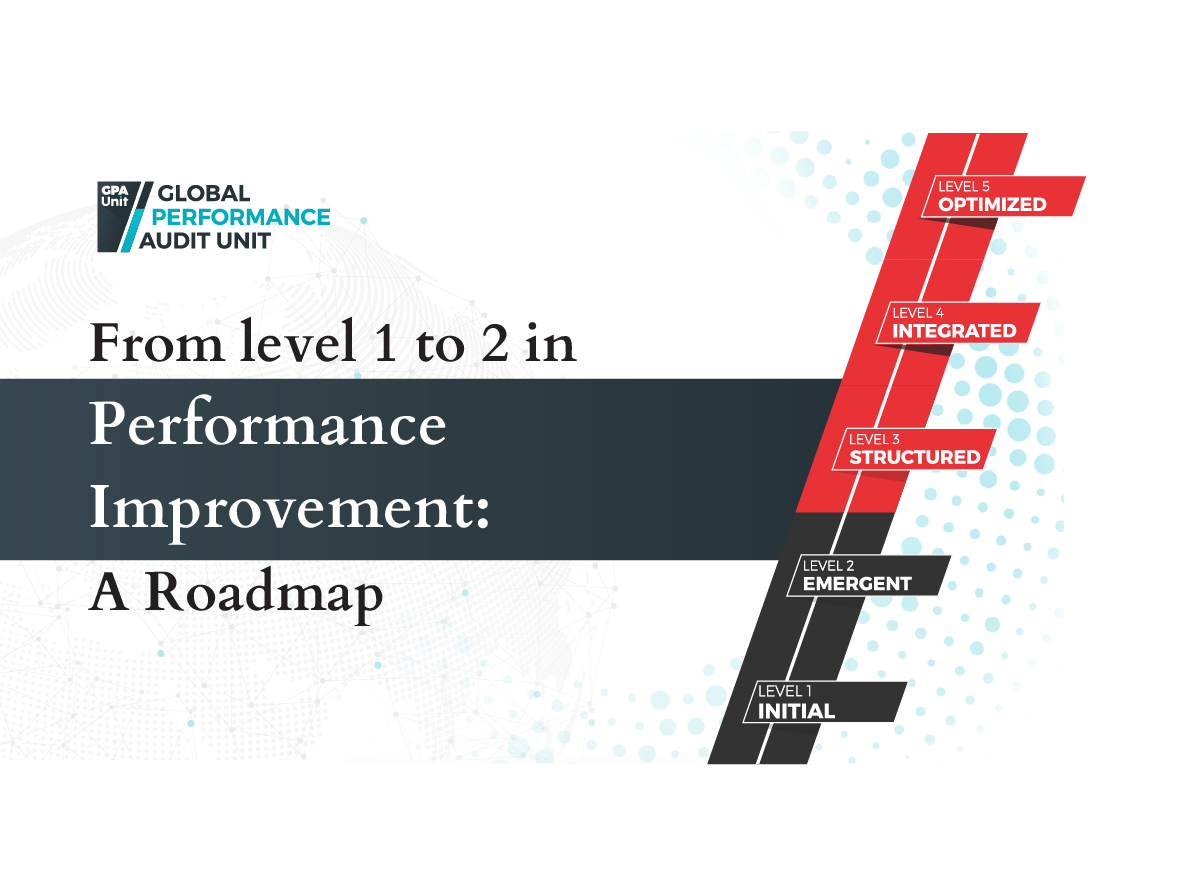First Aid Kit for Maturity Assessments: Your Guide to Seamless Implementation with GPA Unit’s Maturity Model Framework

As businesses find themselves navigating increasingly competitive markets, understanding, and committing to improving internal maturity become essential. Maturity assessments are a powerful tool for organizations to evaluate their performance management systems, identify strengths, zoom in to concealed weaknesses, and outline actionable steps for growth.
These assessments allow businesses to benchmark against best practices and strategize improvement with a clear sense of direction. However, because of the complexity and all-encompassing nature of the process, many organizations face challenges when rolling out maturity assessments. GPA Unit’s Maturity Assessment services developed on the proprietary Maturity Model Framework provide a structured toolkit that equips companies with everything they need for a transformative experience, from streamlining the entire process, to actionable results.
And since background and context are always useful for a correct perception of the status quo, this article will explore the most recognized modern maturity models, as well as GPA Unit’s proprietary Maturity Model Frameworks.
Popular Maturity Models Run-Through
As you will see going forward, there are several maturity models in use today and each provides distinct insights into organizational process development and operational excellence.
1. Capability Maturity Model Integration (CMMI)
CMMI is mostly used for software engineering and product development, however it can be adapted to other industries. It assesses organizational capability against five maturity levels, ranging from "Initial" (ad hoc & unpredictable processes) to "Optimizing" (continually improving & innovating processes). In a nutshell: CMMI focuses on building repeatable, reliable processes.
2. Business Process Maturity Model (BPMM)
BPMM aims to improve business processes and align them with strategic goals. It examines the organization’s ability to manage and optimize processes systematically and continuously, from the unmanaged ones to a highly optimized and efficient operational framework.
3. People Capability Maturity Model (PCMM)
PCMM assesses an organization’s maturity in managing and developing its workforce. Its focus is on human resources and fostering a productive, motivated, and educated workforce by providing a structured approach to talent management.
4. IT Infrastructure Library (ITIL) Maturity Model
applied widely in IT service management, this model focuses on aligning IT services with the broader needs of the business. It assesses an organization’s capability to deliver and manage IT services through structured levels that guide improvement efforts.
5. ISO/IEC 33001 Process Assessment Model
this model provides a framework for process assessment applicable across various industries. It assesses organizational processes to help organizations achieve standardization and compliance, focusing on quality management and operational efficiency.
These models form the foundation for comprehensive maturity assessments, helping organizations pinpoint areas that need improvement and develop a clear pathway forward.
Embarking on the Maturity Assessment Journey with GPA Unit’s First Aid Kit
Going for a maturity assessment is a powerful move, especially when guided by the right tools and expertise. GPA Unit’s First Aid Kit makes this process straightforward, offering a structured, results-focused approach that ensures both clarity and consistency.
What’s Inside the First Aid Kit?
The First Aid Kit includes essential tools and materials built to facilitate each phase of the assessment and ensure all stakeholders involved in the process stay informed and engaged.
1. Customizable Communication Toolkit
One of the most frequent challenges in maturity assessments is securing buy-in from key stakeholders. To address this, GPA Unit provides clients with a customizable communication toolkit that informs and engages stakeholders from the outset. These materials are designed to explain the purpose, objectives, and anticipated outcomes of the assessment, helping clarify each participant’s role.
By using customizable communication templates, the toolkit provides straightforward messaging that can be tailored to each organization’s particularities. This ensures that stakeholders understand the importance and benefits of the maturity assessment process, thus enabling smoother engagement and alignment.
2. Detailed Project Plan
A well-defined project plan is a ‘must’ when setting expectations and maintaining momentum throughout the assessment. The First Aid Kit includes a structured project plan that outlines each phase, activity, and deliverable. It serves as a roadmap, clarifying the duration, pace, and objectives of each stage. By providing a definite timeline, the project plan builds on trust and transparency, making sure stakeholders can anticipate upcoming checkpoints and actively participate in the assessment process.
But the project plan is more than just a timeline - it’s a living document that evolves as the assessment progresses, ensuring flexibility for adjustments as new insights emerge. For CEOs, COOs, and CMOs, having a structured plan is both reassuring (regarding process reliability) and transparency-fostering as it enables visibility into progress and milestones.
3. Documents Checklist for Evidence-Based Assessment
Evidence-based assessments require a thorough review of internal documentation, from process manuals to performance management tools. To simplify this often complex stage, our First Aid Kit includes a comprehensive documents checklist that ensures relevant materials are gathered in advance. This checklist helps streamline document collection and organization, making it easier to conduct a thorough and accurate assessment.
By centralizing required documents in one checklist, organizations can efficiently prepare for the assessment, ensuring all necessary information is easily accessible. This reduces delays and supports the reliability of the evidence-based insights, contributing to a robust assessment outcome.
4. Perception-Based Survey Configuration
To gain a full picture of the organization’s maturity, it’s critical to understand internal perceptions. The First Aid Kit includes a pre-configured survey with statements that allow key stakeholders to rate their perceptions. The resulting insights reveal internal strengths and areas for improvement, adding to the findings delivered by the evidence-based assessments.
This survey goes beyond surface-level metrics, better capturing the organizational culture, employee engagement, and the alignment between leadership and operational teams. The results provide an invaluable internal perspective that highlights discrepancies or confirms alignment, offering leadership insight into the real pulse of the organization.
5. Activity Progress Reports
Consistent communication is crucial throughout the assessment journey. The First Aid Kit provides regular progress reports that keep all stakeholders updated on key activities, progress made, and upcoming steps. These reports feed a proactive approach allowing leadership to stay informed and actively engaged, while also creating opportunities for course correction, if needed.
Progress reports enable CEOs and executives to respond dynamically, as insights unfold and save time in the process. This structured communication strengthens trust and facilitates a collaborative environment that is crucial for implementing lasting improvements.
Why Use the First Aid Kit?
GPA Unit’s First Aid Kit is more than just a toolkit - it’s a structured, strategic approach to maturity assessment that enhances transparency, alignment, and efficiency. With a clear roadmap, customizable communication tools, and regular progress reports, clients benefit from a cohesive, guided experience that minimizes uncertainty and maximizes impact.
By using GPA Unit’s proprietary Maturity Model Framework, organizations gain a precise understanding of their current maturity levels and a roadmap for strategic evolution. The framework integrates best practices from established maturity models, making it possible for organizations to benchmark their processes and performance against industry standards. With the First Aid Kit, organizations have a reliable, actionable pathway for transforming their performance management practices.
Achieving Strategic Growth through Maturity Assessments
Implementing GPA Unit’s Maturity Model Framework helps organizations assess their operational maturity with confidence, knowing they have access to a reliable, proven methodology. As organizations seek to improve performance, the First Aid Kit offers a structured approach that ensures clarity and engagement across all levels of the organization.
Having at hand the tools and insights provided by the First Aid Kit, CEOs, COOs, and CMOs can confidently choose to start the maturity assessment journey that will deliver a precise evaluation of their organization’s performance management systems. This assessment, in turn, will set the stage for impactful improvements and strategic growth.
If moving to a new maturity level is what your organization needs to advance, count on us to put a shoulder to the wheel - drop us a line and let’s talk!
| DATE | November 19th, 2024 |
| Category | Blog Posts |
| Reading Time | 6 |




